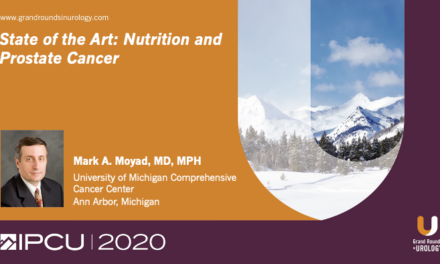Gerald L. Andriole, Jr., MD, presented “Prostate Cancer Risk Assessment: Focus on Early PSA and Hereditary Risk” during the 31st International Prostate Cancer Update in July 2021 in Snowbird, Utah.
How to cite: Andriole, Gerald L. “Prostate Cancer Risk Assessment: Focus on Early PSA and Hereditary Risk.” July 2021. Accessed Jul 2024. https://grandroundsinurology.com/prostate-cancer-risk-assessment-focus-on-early-psa-and-hereditary-risk/
Prostate Cancer Risk Assessment: Focus on Early PSA and Hereditary Risk – Summary
Gerald L. Andriole, Jr., MD, Robert K. Royce Distinguished Professor and Chief of Urologic Surgery at Barnes-Jewish Hospital, the Siteman Cancer Center, and Washington University School of Medicine in St. Louis, Missouri, discusses two areas of prostate cancer risk assessment: age-adapted PSA and hereditary risk. Dr. Andriole begins with an early trial which showed that for men who have a PSA of <1 in their first screening, their 15-year chance of developing metastatic prostate cancer or dying is less than 1%. Their risk level drops down to <0.2% if their PSA value remains at <1 in a second screening. If screenings continue to show low PSA levels as the patient ages, one could conclude that a low-risk score should result in no further screening, but Dr. Andriole cautions against this approach. He then discusses the PROBASE study, a prospective study randomizing PSA testing in men starting at age 45 vs. the standard age of 50. The early arm of the study has 23,301 men and the goal is to look at the detection of Gleason grade group 2 or above cancer by the time a man reaches age 50. Dr. Andriole addresses the role of family history, noting that a positive family history increases the probability of developing prostate cancer, but not necessarily mortality. In contrast, a higher genetic risk score (GRS) is associated with a higher mortality rate. He then discusses using a Prompt score, which is more efficient when compared with a PSA screening alone. Dr. Andriole concludes that physicians should assess PSA early in life and may consider adding in 4K score. Ultimately, a combination of a number of factors, including family history, race and ethnicity, genetic risk score, and PSA, will be needed.
About The 31st Annual International Prostate Cancer Update:
The International Prostate Cancer Update (IPCU), founded in 1990, is a multi-day CME conference focused on prostate cancer treatment updates with expert, international faculty. It is led by expert physicians and is designed for urologists, medical oncologists, radiation oncologists, and other healthcare professionals involved in the diagnosis and treatment of prostate cancer. Dr. Andriole delivered this educational activity during the 31st iteration of the meeting in July 2021 in Snowbird, Utah.
ABOUT THE AUTHOR
Gerald L. Andriole, Jr., MD, is the global Chief Medical Officer at Prostatype Genomics. He previously was Professor and Director of Urology in the National Capital Region at the Brady Urologic Institute at Johns Hopkins University. He also formerly served as the Robert K. Royce Distinguished Professor and Chief of Urologic Surgery at Barnes-Jewish Hospital, the Siteman Cancer Center, and Washington University School of Medicine in St. Louis, Missouri. Dr. Andriole received his medical degree from Jefferson Medical College in Philadelphia, Pennsylvania. He trained in surgery at Strong Memorial Hospital and the University of Rochester and completed his Urology Residency at Brigham and Women’s Hospital and Harvard Medical School. Subsequently, he was a Fellow in Urologic Oncology at the National Cancer Institute in Bethesda, Maryland. Dr. Andriole has over 40 years of consistent contributions in the areas of prostate cancer screening and prevention research as well as BPH. He has contributed over 450 peer-reviewed publications. He chaired the Prostate Committee of NCI’s PLCO Cancer Screening Trial, the Steering Committee of the international REDUCE Chemoprevention Trial and the Prostate Committee of the SUO Clinical Trials Consortium. He is a member of the American Urological Association, the Academy of Master Surgical Educators of the American College of Surgeons, the American Surgical Association, the American Association of Genitourinary Surgeons, and the Clinical Society of Genitourinary Surgeons, among other societies.
He has received the Outstanding Achievement Award from the Urologic Oncology Branch of NCI, the Distinguished Clinician Award from Washington University, the Alumni Award from Jefferson Medical College and the Williams Award for Prostate Cancer Research Excellence from the AUA Urology Care Foundation, among others.



